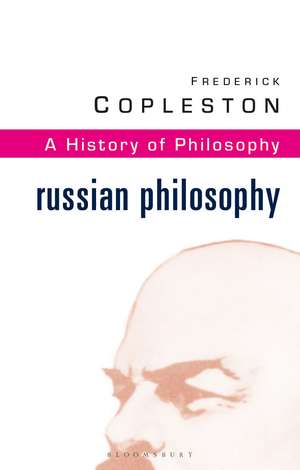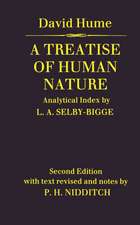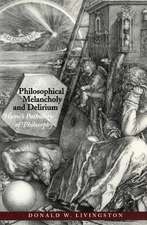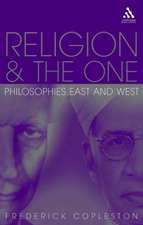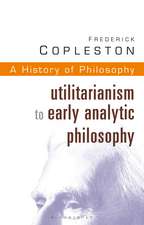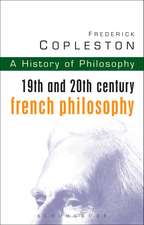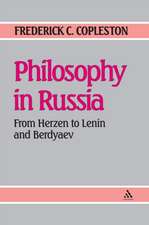History of Philosophy Volume 10: Russian Philosophy
Autor Frederick Coplestonen Limba Engleză Paperback – 5 ian 2003
Preț: 157.71 lei
Preț vechi: 168.91 lei
-7% Nou
Puncte Express: 237
Preț estimativ în valută:
30.18€ • 31.59$ • 24.97£
30.18€ • 31.59$ • 24.97£
Carte disponibilă
Livrare economică 15-29 martie
Livrare express 01-07 martie pentru 44.74 lei
Preluare comenzi: 021 569.72.76
Specificații
ISBN-13: 9780826469045
ISBN-10: 0826469043
Pagini: 464
Dimensiuni: 138 x 216 x 27 mm
Greutate: 0.57 kg
Ediția:New ed
Editura: Bloomsbury Publishing
Colecția Bloomsbury Continuum
Locul publicării:London, United Kingdom
ISBN-10: 0826469043
Pagini: 464
Dimensiuni: 138 x 216 x 27 mm
Greutate: 0.57 kg
Ediția:New ed
Editura: Bloomsbury Publishing
Colecția Bloomsbury Continuum
Locul publicării:London, United Kingdom
Notă biografică
Frederick Copleston was born in Somerset in 1907. After studying at Oxford, he held a number of academic posts, including Professor of the History of Philosophy and Dean of the Faculty of Philosophy at London University. He died in 1994.
Cuprins
Author's Preface1 Introduction2 Chaadaev: Russia and the West3 Ivan Kireevsky and Integral Knowledge4 From Reconciliation with Reality to Revolution5 The New Men6 Peter Lavrov and the Subjective Method7 Dostoevsky and Philosophy8 Meaning in Life and History9 Religion and Philosophy: Vladimir Solovyev10 Marxism in Imperial Russia (1): Plekhanov11 Marxism in Imperial Russia (2): Lenin12 Marxism in the Soviet Union13 Philosophers in Exile (1)14 Philosophers in Exile (2)EpilogueBibliographyIndex
Recenzii
A monumental history ... learned, lucid, patient and comprehensive.
We can only applaud at the end of each act and look forward to applauding again at the final curtain.
We can only applaud at the end of each act and look forward to applauding again at the final curtain.
Descriere
Copleston, an Oxford Jesuit and specialist in the history of philosophy, created his history as an introduction for Catholic ecclesiastical seminaries. The 11-volume series gives an accessible account of each philosopher's work, and explains their relationship to the work of other philosophers.
